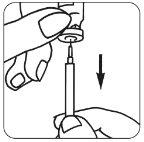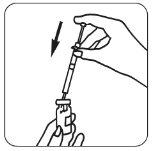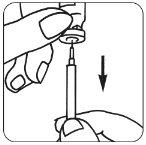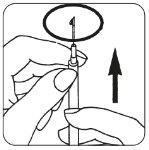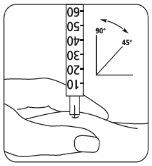
LUVERIS 75 IU POWDER AND SOLVENT FOR INJECTABLE SOLUTION
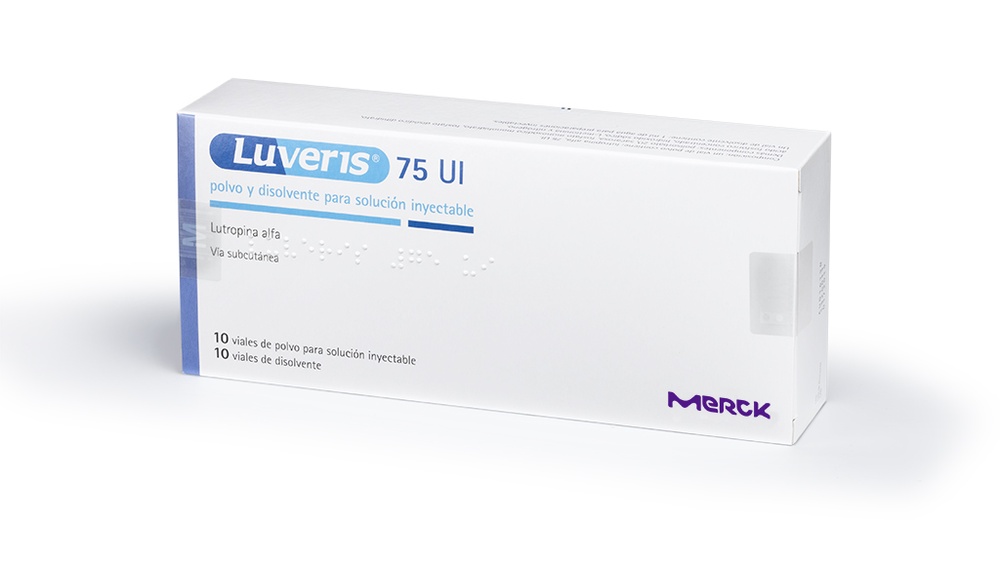

How to use LUVERIS 75 IU POWDER AND SOLVENT FOR INJECTABLE SOLUTION
Translated with AI
This page provides general information and does not replace a doctor’s consultation. Always consult a doctor before taking any medication. Seek urgent medical care if symptoms are severe.
Show originalContents of the leaflet
Introduction
Package Leaflet: Information for the User
Solvent in vials
Luveris 75UI powder and solvent for solution for injection
lutropin alfa
Read all of this leaflet carefully before you start using this medicine because it contains important information for you.
- Keep this leaflet, you may need to read it again.
- If you have any further questions, ask your doctor, pharmacist, or nurse.
- This medicine has been prescribed for you only. Do not pass it on to others. It may harm them, even if their signs of illness are the same as yours.
- If you get any side effects, talk to your doctor, pharmacist, or nurse. This includes any possible side effects not listed in this leaflet. See section 4.
Contents of the pack
- What is Luveris and what is it used for
- What you need to know before you use Luveris
- How to use Luveris
- Possible side effects
- Storing Luveris
- Contents of the pack and other information
1. What is Luveris and what is it used for
What is Luveris
Luveris is a medicine that contains lutropin alfa, a recombinant Luteinizing Hormone (LH), which is essentially similar to the hormone found naturally in humans, but is obtained through biotechnology. It belongs to the family of hormones called gonadotropins, which are involved in the normal control of reproduction.
What is Luveris used for
Luveris is recommended for the treatment of adult women who produce very small amounts of certain hormones involved in the natural reproductive cycle. The medicine is used together with another hormone called follicle-stimulating hormone (FSH) to stimulate the development of follicles, which are the structures in the ovary where eggs (oocytes) mature. This treatment is followed by the administration of a single dose of human Chorionic Gonadotropin (hCG), which causes the release of an egg from the follicle (ovulation).
2. What you need to know before you use Luveris
Do not use Luveris
- if you are allergic to gonadotropins (such as luteinizing hormone, follicle-stimulating hormone, or human chorionic gonadotropin) or to any of the other ingredients of this medicine (listed in section 6).
- if you have ovarian, uterine, or breast cancer.
- if you have been diagnosed with a brain tumor.
- if you have an increase in the size of the ovaries or fluid-filled sacs in the ovaries (ovarian cysts) of unknown origin.
- if you have unexplained vaginal bleeding.
Do not use Luveris if you have any of the above conditions. If you are not sure, talk to your doctor or pharmacist before using this medicine.
Warnings and precautions
Talk to your doctor, pharmacist, or nurse before starting treatment with Luveris.
Before starting treatment, your fertility and that of your partner should be assessed.
It is recommended that you do not use Luveris if you have a clinical condition that makes a normal pregnancy impossible, such as a situation where the ovaries do not function properly due to a disease called primary ovarian insufficiency or malformations of the sexual organs.
Porphyria
Before starting treatment, inform your doctor if you or a family member has porphyria (an inability to break down porphyrins that can be passed from parents to children).
Ovarian Hyperstimulation Syndrome (OHSS)
This medicine stimulates the ovaries. This increases the risk of OHSS. This syndrome occurs when your follicles develop excessively and become large cysts. If you experience abdominal pain, rapid weight gain, nausea, or vomiting, or have difficulty breathing, contact your doctor immediately, who may advise you to stop using this medicine (see section 4 under "Serious side effects").
If you are not ovulating and you follow the recommended dose and dosage regimen, it is less likely that you will experience OHSS. Treatment with Luveris rarely results in severe OHSS. This is more likely to occur if you are also given the medicine used to induce final follicular maturation (which contains human Chorionic Gonadotropin, hCG). See section 3 under "How much to use" for more information. If you develop OHSS, your doctor may not administer hCG in this treatment cycle and may advise you to abstain from intercourse or use barrier contraceptives for at least four days.
Your doctor will ensure careful monitoring of ovarian response, through ultrasound and blood tests, before and during treatment.
Multiple pregnancy
When using Luveris, there is a higher risk of conceiving more than one baby at a time ("multiple pregnancy", mostly twins) than if you had conceived naturally. A multiple pregnancy can involve medical complications for you and your babies. You can reduce the risk of multiple pregnancy by using the correct dose of Luveris at the indicated times. When undergoing assisted reproduction techniques, the risk of having a multiple pregnancy is associated with your age, the quality and number of eggs fertilized, or the embryos implanted.
Miscarriage
When undergoing assisted reproduction techniques or ovarian stimulation to produce eggs, it is more likely that a miscarriage will occur than in the average woman.
Ectopic pregnancy
Women with a history of fallopian tube disease are at risk of ectopic pregnancy (pregnancy in which the embryo implants outside the uterus), regardless of whether the pregnancy is achieved through spontaneous conception or fertility treatment.
Blood coagulation problems (thromboembolic events)
Talk to your doctor before starting treatment with Luveris if you or a family member has had blood clots in the leg or lung, or a heart attack or stroke. You may be at a higher risk of serious blood clots or worsening of existing blood clots when receiving treatment with Luveris.
Tumors of the sexual organs
Tumors in the ovaries and other sexual organs, both benign and malignant, have been reported in women who have received various drug treatments for infertility.
Congenital defects
Congenital defects after assisted reproduction techniques may be slightly higher than after spontaneous pregnancies. This may be due to differences related to the parents, such as the mother's age and genetic background, interventions related to assisted reproduction techniques, and multiple pregnancy.
Children and adolescents
Luveris is not indicated for use in children and adolescents under 18 years of age.
Other medicines and Luveris
Tell your doctor or pharmacist if you are using, have recently used, or might use any other medicines.
Do not use Luveris mixed with other medicines in the same injection, except for folitropin alfa, if your doctor prescribes it.
Pregnancy and breastfeeding
Do not use Luveris if you are pregnant or breastfeeding.
Talk to your doctor or pharmacist before using any medicine.
Driving and using machines
Luveris has no or negligible influence on the ability to drive and use machines.
Luveris contains sodium
Luveris contains less than 1 mmol of sodium (23 mg) per dose; this is essentially "sodium-free".
3. How to use Luveris
Follow the instructions for administration of this medicine exactly as prescribed by your doctor. If you are unsure, consult your doctor again.
Using this medicine
Your doctor will decide the dose and administration regimen most suitable for you throughout the treatment.
How much to use
Luveris is usually used daily for a maximum of three weeks, simultaneously with FSH injections.
- The usual initial dose is75 UI (1 vial) of Luveris together with 75 UI or 150 UI of FSH.
- Depending on the response,your doctor may increase the dose of FSH, preferably with increases of 37.5 to 75 UI every 7-14 days.
Your doctor may decide to extend the treatment up to 5 weeks.
When the desired response has been achieved, a single injection of hCG should be given 24 to 48 hours after the last injection of Luveris and FSH. It is recommended that you have intercourse on the same day as the administration of hCG, as well as the next day. Alternatively, intrauterine insemination or another medically assisted reproduction procedure may be performed, at the discretion of your doctor.
If an excessive response is obtained, treatment should be discontinued and hCG should not be administered (see section 4 under "Ovarian Hyperstimulation Syndrome (OHSS)"). For the next cycle, your doctor will prescribe a lower dose of FSH than in the previous cycle.
Method of administration
Luveris should be administered subcutaneously, i.e., by injecting just under the skin. Each vial is for single use.
If you are administering Luveris yourself, read the following instructions carefully:
- Wash your hands. It is important that your hands and the materials you use are as clean as possible.
- Gather everything you will need. Find a clean place and prepare everything:
- a vial of Luveris,
- a vial of solvent,
- two cotton balls soaked in alcohol,
- a syringe,
- a reconstitution needle to dissolve the powder with the solvent,
- a fine needle for subcutaneous injection,
- a container for sharp objects to safely dispose of glass containers and needles.
- Remove the protective cap from the vial of solvent: Place the reconstitution needle
| in the syringe and introduce some air into the syringe by pulling the plunger approximately to the 1 ml mark. Then, insert the needle into the vial, push the plunger to expel the air, place the vial upside down, and gently withdraw all the solvent. Place the syringe carefully on the table, trying not to touch the needle. |
- Prepare the injection solution: Remove the protective cap from the vial containing
| the Luveris powder,take your syringe, and slowly inject the solvent into the Luveris vial. Move it gently without withdrawing the syringe. Do not shake. |
- Once the powder has dissolved (which usually happens immediately), check that the
| obtained solution is clear and does not contain any particles. Place the vial upside down and gently withdraw the solution into the syringe. |
You can also mix Luveris and folitropin alfa, as an alternative to injecting each product separately. After dissolving the Luveris powder, load the solution into the syringe and reinject it into the container that contains the folitropin alfa powder. Once the powder has dissolved, withdraw the solution with the syringe. Check for particles as indicated above and do not use the solution if it is not clear.
Up to 3 powder containers can be dissolved in 1 ml of solvent.
- Change the needle by placing the fine needleand remove any air bubbles: If you see any
| air bubbles in the syringe, hold the syringe with the needle facing upwards and tap the syringe until the air collects at the top. Gently push the plunger until the air bubbles disappear. |
- Inject the solution immediately: Your doctor or nurse will have told you where to
| inject (e.g., abdomen, front of the thigh). Clean the chosen area with an alcohol-soaked cotton ball. Firmly pinch the skin and insert the needle at an angle of 45° to 90°, with a movement similar to a dart. Inject under the skin, as instructed. Do not inject directly into a vein. Introduce the solution by gently pressing the plunger. Take all the time you need to inject the entire solution. Immediately remove the needle and clean the skin with an alcohol-soaked cotton ball, making a circular motion. |
- Dispose of all used materials: Once the injection is complete, immediately discard all used needles and empty glass containers in the container for sharp objects provided. Any unused portion of the solution should be discarded.
If you use more Luveris than you should
The effects of an overdose of Luveris are unknown; however, there is a possibility that OHSS may occur (see section 4). However, this will only happen if hCG is administered (see section 2 under "Warnings and precautions").
If you forget to use Luveris
Do not use a double dose to make up for forgotten doses. Contact your doctor.
If you have any further questions on the use of this medicine, ask your doctor, pharmacist, or nurse.
4. Possible side effects
Like all medicines, this medicine can cause side effects, although not everybody gets them.
Serious side effects
Contact your doctor immediately if you notice any of the following side effects. Your doctor may advise you to stop using Luveris.
Allergic reaction
Allergic reactions such as skin rash, skin redness, blisters, and facial inflammation with difficulty breathing can be serious in some cases. This side effect is very rare (may affect up to 1 in 10,000 people).
Ovarian Hyperstimulation Syndrome (OHSS)
- Abdominal pain in the lower region accompanied by nausea or vomiting can be symptoms of OHSS. The ovaries may have overreacted to treatment and formed large fluid-filled sacs or cysts (see section 2 under "Ovarian Hyperstimulation Syndrome (OHSS)"). This side effect is common (may affect up to 1 in 10 people). If this happens, your doctor will need to examine you as soon as possible.
- In very rare cases, serious blood coagulation complications (thromboembolic events) may occur, usually with severe OHSS. This can cause chest pain, shortness of breath, stroke, or heart attack (see section 2 under "Blood coagulation problems").
Other frequent side effects
- Headache
- Nausea, vomiting, diarrhea, abdominal discomfort, or abdominal pain
- Fluid-filled sacs in the ovaries (ovarian cysts), chest pain, and pelvic pain
- Local reactions at the injection site, such as pain, itching, bruising, inflammation, or irritation
No cases of ovarian torsion or abdominal bleeding have been reported after treatment with Luveris; however, rare cases have been reported after treatment with human menopausal gonadotropin (hMG), a medicine obtained from urine, which also contains LH.
Ectopic pregnancy may occur, especially in women with a history of fallopian tube disease.
Reporting of side effects
If you experience any side effects, talk to your doctor, pharmacist, or nurse, even if it is possible side effects not listed in this leaflet. You can also report side effects directly through the Spanish Pharmacovigilance System for Human Use Medicines: www.notificaRAM.es. By reporting side effects, you can help provide more information on the safety of this medicine.
5. Storing Luveris
Keep this medicine out of the sight and reach of children.
Do not use this medicine after the expiry date which is stated on the carton and on the vials after EXP. The expiry date is the last day of the month shown.
Do not store above 25°C. Store in the original package to protect from light.
Do not use this medicine if you notice visible signs of deterioration, such as discoloration of the powder or damage to the container.
The medicine should be administered immediately after dissolving the powder.
The solution should not be administered if it contains particles or is not clear.
Medicines should not be disposed of via wastewater or household waste. Ask your pharmacist how to dispose of medicines no longer required. This will help protect the environment.
6. Package Contents and Additional Information
Luveris Composition
- The active ingredient is lutropin alfa. One vial of injectable powder contains 75 IU (International Units).
- Lutropin alfa is Recombinant Human Luteinizing Hormone, r-hLH, produced using recombinant DNA technology.
- The other components of the powder are polysorbate 20, sucrose, monosodium phosphate monohydrate, disodium phosphate dihydrate, concentrated phosphoric acid, sodium hydroxide, L-methionine, and nitrogen.
- The solvent is water for injectable preparations.
Product Appearance and Package Contents
- Luveris is presented as a powder and solvent for injectable solution.
- Each vial of powder contains 75 IU of lutropin alfa and each vial of solvent contains 1 ml of water for injectable preparations.
- Luveris is presented in boxes containing 1, 3, or 10 vials of powder along with the same number of vials of solvent.
Marketing Authorization Holder
Merck Europe B.V.
Gustav Mahlerplein 102
1082 MA Amsterdam
Netherlands
Manufacturer
Merck Serono S.p.A.
Via delle Magnolie 15
70026 Modugno (Bari)
Italy
Date of Last Revision ofthis Leaflet:06/2022
Detailed information on this medicinal product is available on the European Medicines Agency website: http://www.ema.europa.eu.
- Country of registration
- Active substance
- Prescription requiredYes
- Manufacturer
- This information is for reference only and does not constitute medical advice. Always consult a doctor before taking any medication. Oladoctor is not responsible for medical decisions based on this content.
- Alternatives to LUVERIS 75 IU POWDER AND SOLVENT FOR INJECTABLE SOLUTIONDosage form: INJECTABLE, 150 IU/ 0.25 ml (11 micrograms/ 0.25 ml)Active substance: follitropin alfaManufacturer: Gedeon Richter Plc.Prescription requiredDosage form: INJECTABLE, 150 IU/ 0.25 ml (11 micrograms/ 0.25 ml)Active substance: follitropin alfaManufacturer: Gedeon Richter Plc.Prescription requiredDosage form: INJECTABLE, 150 IU/0.25 ml (11 micrograms/0.25 ml)Active substance: follitropin alfaManufacturer: Gedeon Richter Plc.Prescription required
Online doctors for LUVERIS 75 IU POWDER AND SOLVENT FOR INJECTABLE SOLUTION
Discuss questions about LUVERIS 75 IU POWDER AND SOLVENT FOR INJECTABLE SOLUTION, including use, safety considerations and prescription review, subject to medical assessment and local regulations.
Frequently Asked Questions




